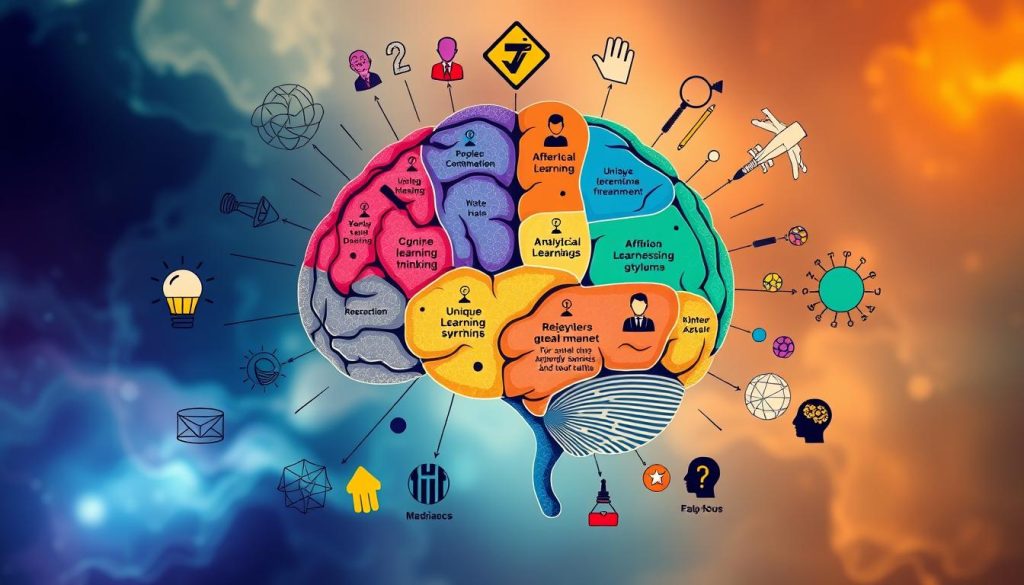Asperger’s syndrome has long been a topic of interest in the field of neurodevelopmental conditions. This guide explores its place within autism spectrum disorders. It sheds light on current understanding and expert insights.
As we explore Asperger’s syndrome, we’ll uncover its unique features. We’ll see how it relates to the broader autism spectrum. This journey will help you understand the nuances of this fascinating neurodevelopmental condition.
Our expert-led exploration aims to provide clarity on Asperger’s syndrome. We’ll discuss its diagnosis and its impact on individuals. Let’s begin our deep dive into this important aspect of autism spectrum disorders.
Understanding Asperger’s Syndrome: A Historical Perspective
Asperger’s syndrome is a term often used in talks about pervasive developmental disorders. It has a long history. This condition, now part of the autism spectrum, has changed a lot in how we understand and classify it.
Hans Asperger’s Original Research
In 1944, Austrian pediatrician Hans Asperger described a pattern in boys. They had normal intelligence but had trouble with social interactions. His work was the start of what we now call Asperger’s syndrome.
Asperger noticed these children’s deep focus on certain topics. They also had trouble with non-verbal communication.
Evolution of Diagnostic Criteria
The path of Asperger’s syndrome from a unique condition to part of the autism spectrum has been complex. At first, it was seen as different from autism in medical guides. But as time went on, researchers found similarities with other pervasive developmental disorders. This led to changes in how it was classified.
Changes in Clinical Understanding
Our understanding of Asperger’s syndrome has changed a lot. It was once seen as a mild form of autism. Now, it’s seen as part of the broader autism spectrum.
This shift shows a better understanding of neurodevelopmental diversity. It has also changed how professionals diagnose and treat it.
| Time Period | Classification | Key Features |
|---|---|---|
| 1944-1980s | Separate condition | Social difficulties, normal intelligence |
| 1990s-2013 | Distinct diagnosis | Part of pervasive developmental disorders |
| 2013-Present | Part of ASD | Spectrum-based approach to diagnosis |
Is Asperger’s on the Autism Spectrum: Current Medical Consensus
The medical world now sees Asperger’s as part of autism spectrum disorders. This change has changed how we deal with neurodevelopmental conditions. Experts say people with Asperger’s share traits with those with high-functioning autism.

Studies show Asperger’s and autism spectrum disorders share many traits. These include problems with social communication and limited interests. The big difference is in language skills and thinking abilities. People with Asperger’s usually have average or above-average intelligence and no big language delays.
Experts agree that Asperger’s is part of the autism spectrum. This view helps in giving more specific support and help. It lets us understand each person’s needs better within the spectrum of neurodevelopmental conditions.
- Asperger’s is now considered part of autism spectrum disorders
- Shared traits include social communication challenges
- Differences in language development and cognitive abilities exist
- Tailored support is key for those with high-functioning autism
This change in thinking has led to new ways of diagnosing. It highlights the need for early detection and help. By seeing Asperger’s as part of the autism spectrum, doctors can offer better support strategies.
The DSM-5 Reclassification of Asperger’s Syndrome
The Diagnostic and Statistical Manual of Mental Disorders (DSM-5) made big changes to how we diagnose autism. It combined Asperger’s syndrome with other disorders under one name: Autism Spectrum Disorder (ASD).
Reasons for Diagnostic Changes
The update aimed to make diagnoses more accurate and consistent. Experts realized that Asperger’s and autism share key symptoms. This made it hard to tell them apart. The change shows a move towards seeing autism as a range of conditions, not separate disorders.
Impact on Clinical Practice
The DSM-5 changes changed how doctors diagnose autism. Now, they look at how severe symptoms are and what support is needed. This helps create treatment plans that fit each person better.
Community Response to Reclassification
The DSM-5 changes got mixed reactions from the Asperger’s and autism communities. Some liked the inclusive approach, while others worried about losing their identity. There were also concerns about getting the right services and support for those with Asperger’s syndrome.
| Aspect | Before DSM-5 | After DSM-5 |
|---|---|---|
| Diagnosis | Separate diagnoses for Asperger’s and autism | Single diagnosis of Autism Spectrum Disorder |
| Focus | Distinct categories | Spectrum of symptoms and support needs |
| Treatment | Condition-specific approaches | Individualized plans based on symptom severity |
Distinguishing Features of Asperger’s Within the Autism Spectrum
Asperger’s syndrome is now part of autism spectrum disorders. It has special traits that make it stand out. People with Asperger’s often have average or above-average intelligence. They also face challenges in social communication.

They have intense, focused interests. These passions can make them experts in certain areas. Unlike others, they usually learn to speak on time. But, they might struggle with the subtleties of conversation and non-verbal signals.
Social interactions in Asperger’s are unique. They want to connect with others but find it hard to follow social rules. This can lead to awkward or inappropriate behavior in social settings.
- Advanced vocabulary and formal speech patterns
- Difficulty with eye contact and body language interpretation
- Literal interpretation of language
- Strong adherence to routines and rituals
Sensory sensitivities are common in Asperger’s. They can affect daily life. These sensitivities might include being overly sensitive to sounds, lights, textures, or smells. Knowing these traits helps in providing the right support and interventions for those on this spectrum.
Social Communication Patterns in Asperger’s Syndrome
People with Asperger’s syndrome face unique challenges in social communication. These issues affect how they interact and form relationships.
Verbal Communication Characteristics
Those with Asperger’s might have a big vocabulary but struggle with everyday talk. They might speak in a flat tone or find it hard to get sarcasm and idioms. Their speech can seem very formal and exact, almost like a script.
Non-verbal Communication Challenges
Non-verbal cues are tough for those with Asperger’s. They might find it hard to read facial expressions, body language, and gestures. Even eye contact can be awkward or not consistent. These issues can cause misunderstandings in social settings.
Social Interaction Patterns
Social interactions for those with Asperger’s are unique. They might have strong interests in certain topics and find it hard to do small talk. They might also find it hard to take turns in conversations, leading to dominating discussions on their favorite subjects.
| Communication Aspect | Typical Pattern in Asperger’s | Impact on Social Interactions |
|---|---|---|
| Verbal | Advanced vocabulary, literal interpretation | Difficulty with social subtleties |
| Non-verbal | Limited understanding of body language | Misinterpretation of social cues |
| Social Interaction | Focused interests, challenges with small talk | Potential for one-sided conversations |
It’s key to understand these communication patterns to support those with Asperger’s. This helps create more inclusive spaces for everyone in the autism spectrum community.
Cognitive Abilities and Learning Styles
People with Asperger’s syndrome have unique ways of thinking and learning. These traits affect how they understand and interact with the world. Knowing these traits helps create better learning plans for those with neurodevelopmental conditions.
Many with Asperger’s are really good at certain things. They might have amazing memory or excel in math, science, or music. This fits with the idea of high-functioning autism, where they have strengths but face social challenges.

Those with Asperger’s often prefer learning through pictures and clear, structured information. They find it hard to understand abstract ideas. But, they do well with visual learning and solving problems in a structured way.
| Cognitive Trait | Typical Manifestation | Learning Implication |
|---|---|---|
| Attention to Detail | Focus on specific facts or objects | Excels in tasks requiring precision |
| Pattern Recognition | Ability to spot trends and sequences | Performs well in logical subjects |
| Literal Thinking | Interprets information concretely | May struggle with abstract concepts |
| Strong Memory | Recalls facts and details easily | Benefits from fact-based learning |
Teachers can use these strengths to help students with Asperger’s. By teaching in ways that match their learning styles, they can improve learning for those on the autism spectrum.
Sensory Processing and Environmental Sensitivities
People with autism spectrum disorders often face unique sensory challenges. These challenges can change how they see their world and affect their daily lives. It’s key to understand these sensitivities to find good ways to cope.
Common Sensory Triggers
Those with Asperger’s syndrome might find some things too much or upsetting. Sensory issues differ from person to person. Here are some common things that might bother them:
- Loud noises or sudden sounds
- Bright lights or flashing images
- Strong smells or tastes
- Certain textures on skin or in food
- Crowded spaces or physical touch
Coping Strategies and Adaptations
Many with autism spectrum disorders find ways to handle their sensory sensitivities. These strategies can make life easier and less stressful:
| Strategy | Description | Benefits |
|---|---|---|
| Noise-canceling headphones | Reduce auditory input | Decreases anxiety in noisy environments |
| Sunglasses or dimmed lighting | Lessen visual stimulation | Improves comfort in bright spaces |
| Weighted blankets | Provide deep pressure | Promotes relaxation and better sleep |
| Sensory-friendly clothing | Avoid irritating fabrics | Increases comfort throughout the day |
By understanding and dealing with sensory sensitivities, people with Asperger’s can move through their world more easily. They can succeed in different places.
Special Interests and Focused Behaviors
People with Asperger’s syndrome often have a deep interest in certain topics. This is a key feature of autism spectrum disorders. They might spend a lot of time learning about their favorite subjects, becoming true experts in their fields.

- Science and technology
- History and geography
- Music and art
- Collecting specific items
- Transportation systems
These special interests can be both a blessing and a challenge. They lead to deep knowledge, but might make it hard to connect with others. People with Asperger’s might find it tough to talk about things outside their area of interest.
| Aspect | Impact |
|---|---|
| Social Life | May limit diverse interactions |
| Career | Can lead to success in specialized fields |
| Learning | Enhances focus and retention in specific areas |
| Time Management | Can interfere with daily responsibilities |
It’s important to understand these focused behaviors to support those with Asperger’s syndrome. By using these interests in a positive way, we can help them succeed in both their personal and professional lives.
Executive Functioning and Daily Living Skills
People with Asperger’s syndrome often face challenges in executive functioning, impacting their daily lives. These difficulties are common in neurodevelopmental conditions like high-functioning autism. Let’s explore the hurdles and strategies for managing them.
Organization and Planning Challenges
Individuals with Asperger’s syndrome may struggle with organizing tasks and planning ahead. This can affect their ability to complete assignments, manage household chores, or maintain a structured routine. Many find it hard to break down complex tasks into manageable steps, leading to feelings of overwhelm.
Time Management Strategies
Effective time management is key for those with Asperger’s syndrome. Here are some helpful strategies:
- Use visual schedules and calendars
- Set reminders on phones or smartwatches
- Break tasks into smaller, timed segments
- Utilize time-tracking apps to monitor productivity
Implementing these techniques can significantly improve daily functioning for individuals with Asperger’s syndrome and other neurodevelopmental conditions.
| Executive Function | Challenge | Strategy |
|---|---|---|
| Planning | Difficulty breaking down tasks | Use checklists and flowcharts |
| Organization | Cluttered workspace | Implement color-coding systems |
| Time Management | Losing track of time | Set alarms for task transitions |
Emotional Regulation and Mental Health Considerations
People with Asperger’s syndrome, a part of autism spectrum disorders, often struggle with emotional control. These conditions affect how they feel and show emotions, leading to special mental health needs.

Those with Asperger’s may feel emotions deeply and find it hard to handle them. This can cause emotional outbursts or trouble in sharing feelings. It’s key to understand these issues to help with mental health in autism spectrum.
Common mental health problems in Asperger’s include:
- Anxiety
- Depression
- Obsessive-compulsive disorder (OCD)
- Attention deficit hyperactivity disorder (ADHD)
Learning coping strategies and getting professional help can tackle these issues. Cognitive-behavioral therapy, mindfulness, and social skills training help with emotional control in neurodevelopmental conditions.
| Emotional Regulation Strategy | Benefits |
|---|---|
| Deep breathing exercises | Reduces anxiety and promotes calmness |
| Sensory breaks | Helps manage overstimulation and stress |
| Journaling | Improves self-awareness and emotional expression |
| Regular exercise | Boosts mood and reduces stress levels |
By focusing on emotional control and mental health, people with Asperger’s can improve their well-being and life quality.
Diagnosis Process and Assessment Methods
The process to diagnose autism involves a detailed look at a person’s behavior, how they communicate, and their past development. For those with Asperger’s syndrome, now part of autism spectrum disorders, the check-up is detailed and covers many areas.
Diagnostic Tools and Evaluations
Experts use different tools to check for autism. These include tests, watching how a person acts, and talking to their family. Some common tools are:
- Autism Diagnostic Observation Schedule (ADOS)
- Autism Diagnostic Interview-Revised (ADI-R)
- Childhood Autism Rating Scale (CARS)
Professional Team Involvement
A team of experts often works together to diagnose. This team might include psychologists, speech therapists, occupational therapists, and pediatricians. Each one adds their own view to understand a person’s abilities and challenges.
Age Considerations in Diagnosis
The age when someone is checked can affect the diagnosis. Early diagnosis is good, but Asperger’s symptoms might show up more as a child gets older. Adults looking for a diagnosis face different hurdles, as their symptoms and ways of dealing with them have likely changed over time.
| Age Group | Diagnostic Challenges | Common Signs |
|---|---|---|
| Toddlers (2-3 years) | Limited verbal skills | Lack of eye contact, delayed speech |
| School-age (6-12 years) | Masking behaviors | Social difficulties, intense interests |
| Adults (18+) | Developed coping strategies | Career challenges, relationship issues |
Treatment and Support Approaches
Living with Asperger’s syndrome, a part of the autism spectrum, has its own set of challenges. But, there’s a silver lining – many effective treatments and support methods are available. These aim to enhance the quality of life for those with this neurodevelopmental condition.
Therapy is a vital part of managing Asperger’s syndrome. Speech therapy can improve communication skills. Occupational therapy teaches daily living skills. Cognitive behavioral therapy helps with emotional regulation.
These targeted interventions can significantly impact daily life.
Support goes beyond therapy. Social skills groups offer practice in real-life settings. Educational support helps students with autism spectrum disorders succeed in school. For adults, job coaching can ease workplace challenges. Family education empowers loved ones to provide informed support at home.
It’s important to remember that each person with Asperger’s syndrome is unique. What works for one may not work for another. A personalized approach, combining different treatments and supports, often yields the best results. With the right help, individuals with this form of autism can lead fulfilling, successful lives.
FAQ
Q: Is Asperger’s syndrome a separate diagnosis anymore?
A: No, Asperger’s syndrome is no longer seen as a separate diagnosis. In 2013, the DSM-5 changed it to be part of autism spectrum disorders. This change shows that Asperger’s is seen as part of the autism spectrum, not a separate condition.
Q: How does Asperger’s differ from other forms of autism?
A: Asperger’s is now seen as part of the autism spectrum. People with Asperger’s usually have average or above-average intelligence. They also have strong language skills and intense interests.
But, they might find social communication hard and have strict patterns of behavior. These traits are common in the autism spectrum.
Q: What are the main characteristics of Asperger’s syndrome?
A: Key traits of Asperger’s include social communication challenges and struggles with non-verbal cues. People with Asperger’s often have strong verbal skills but find social interaction and emotional expression hard.
They also have intense interests, prefer routines, and might be sensitive to certain sounds or smells.
Q: Can adults be diagnosed with Asperger’s syndrome?
A: Yes, adults can get a diagnosis that matches what was once called Asperger’s syndrome. Many adults realize their traits later in life and seek a diagnosis. The diagnosis process for adults looks at their developmental history, current behaviors, and cognitive abilities.
Q: How does the reclassification of Asperger’s affect those previously diagnosed?
A: The change to autism spectrum disorders doesn’t make previous diagnoses invalid. People diagnosed with Asperger’s before the DSM-5 change can keep their diagnosis or update it. The change mainly affects new diagnoses and research.
Q: What treatments are available for individuals with Asperger’s-like traits?
A: Treatments for Asperger’s-like traits include social skills training and cognitive behavioral therapy. Occupational and speech therapy are also options. The goal is to address challenges, enhance strengths, and improve quality of life.
Treatment plans are tailored to each person’s unique needs.
Q: How do sensory sensitivities affect individuals with Asperger’s-like traits?
A: Sensory sensitivities are common in those with Asperger’s-like traits. They might be overly sensitive to sounds, lights, textures, or smells. This can cause discomfort or overwhelm in certain places.
Developing coping strategies and making environmental changes can help manage these sensitivities.
Q: What is the relationship between special interests and Asperger’s syndrome?
A: Restricted interests are a key feature of Asperger’s syndrome and autism spectrum disorders. People often have intense, focused interests in specific topics or activities. These interests can bring joy and expertise but can also cause challenges in social situations or time management.


















